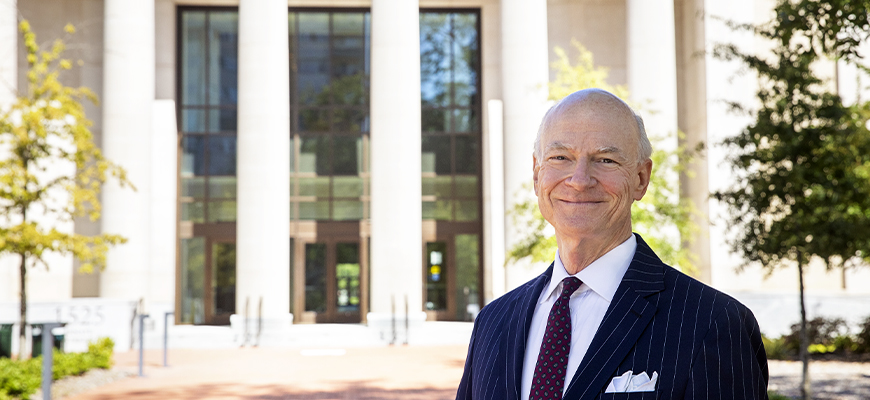
William Hubbard starts tenure as law school dean
50 years after arriving at UofSC as a student, former Carolina Scholar leads profession into the future
Posted on: September 28, 2020; Updated on: September 28, 2020
By Craig Brandhorst, craigb1@mailbox.sc.edu, 803-777-3681
If Gamecock Bingo were a thing, William Hubbard, ’74, could be waving his card in the air. Magna cum laude graduate, law school graduate, 34 years on the University of South Carolina Board of Trustees, including four as chair — he’s stamped enough squares.
But Hubbard’s the restless sort. Instead of contemplating retirement, the longtime Nelson Mullins partner and past president of the American Bar Association is focused on his new tenure as dean of his alma mater’s School of Law.
“It's taken me a long time to figure out that I'm really happiest when I'm solving a problem and helping people rather than just having leisure time,” says Hubbard, who succeeded Robert Wilcox as dean in August. “I don't know what it is, might be my upbringing. I almost feel guilty if I'm not working, or helping somebody, or solving a problem.”
Hubbard came to the university in 1970 as a Carolina Scholar and quickly found himself surrounded by other high-achievers. Current South Carolina Honors College Dean Steve Lynn was a classmate. So was fellow history major and current College of Arts and Sciences Dean Lacy Ford. A demanding faculty, a rigorous curriculum and that competitive cohort soon had Hubbard working even harder.
The one time I don't think about my tasks is when I'm watching Gamecock sports ... I truly, truly get into those games, and I still love being part of the Gamecock family.
William Hubbard
He cites history professor Robert Patterson, in particular, with leaving an indelible mark — or several, in fact — during his honors history course freshman year.
“I'll never forget the first paper I turned in to Dr. Patterson,” says Hubbard. “It had so much red on it I thought he had cut himself. I learned then that I could do better, and I had to do better because the people in those honors courses were really bright.”
Hubbard ultimately received the Algernon Sydney Sullivan Award, the highest academic honor bestowed upon an undergraduate. From there, it was law school, litigation and a long career shaping public policy through the courts and, eventually, through his presidency of the ABA.
“Being a student here changed my life because I had some professors who really caused me to think differently about myself and about the possibilities,” he says.
Hubbard’s undergraduate experience also caused him to think about the possibilities for his alma mater. Less than 10 years out of law school, in 1986, board member and fellow Florence native Eddie Floyd convinced Hubbard to throw his hat in the ring for a spot on the Board of Trustees representing Richland and Kershaw counties.
“I probably didn’t know any better than to run. I’m sure I was not expected to win,” he says. “But I spent a lot of time talking to the not-so-powerful members of the General Assembly. I was the underdog, and I think they saw themselves as underdogs, and one day we all woke up and found I had enough commitments.”
Hubbard was already a proven attorney, but he was tested when concerns arose about university finances under then-President James Holderman. Shortly after he was seated on the board, Hubbard was appointed chair of the new Fiscal Affairs committee charged with overseeing the president’s expenditures. He smiles about it now, but at the time it was no laughing matter.
“I was the newbie — I was in my 30s — and President Holderman was powerful and had a lot of political support,” Hubbard recalls. “But I was trying to make sure that we were spending public funds in an appropriate way.
“That was the biggest challenge, dealing with the power structure as a very young board member. You're always questioning yourself: What if I'm wrong? What if he's right? There was a lot of room for introspection on my part.”
Along with a strong work ethic, that penchant for introspection may be Hubbard’s other defining characteristic, what he will lean on as he fights for funding at the law school, promotes faculty scholarship, champions the hard work of law school staff and trumpets the accomplishments of law students.
Being a student here changed my life because I had some professors who really caused me to think differently about myself and about the possibilities.
William Hubbard
“I've been studying the trends,” he says. “Where's the profession headed? What's the profession going to look like 10 years from now? How can we be more nimble? To paraphrase Wayne Gretzky, how can we make sure we're skating to where the puck is going rather than where it is now?”
Fifty years after arriving at the university, Hubbard is still in some respects a Carolina Scholar, and not just at the office. He reads half a dozen books at once and devours current events.
“I mostly read nonfiction,” he says, rattling off titles on Abraham Lincoln, the Gettysburg Address and the Supreme Court during the presidency of Franklin Delano Roosevelt. A perfect Saturday is “time for two cups of coffee instead of one,” plus The New York Times, The State and The Wall Street Journal, followed by a workout, maybe a nap, a 3 p.m. football start or an evening basketball game — “And winning always helps.”
Yes, Hubbard still finds time to sport the garnet and black, however busy he is, whatever the season.
“The one time I don't think about my tasks is when I'm watching Gamecock sports,” he says. “I pound on the table, jump up and down and whoop and holler. I truly, truly get into those games, and I still love being part of the Gamecock family. I enjoy the whole experience.”